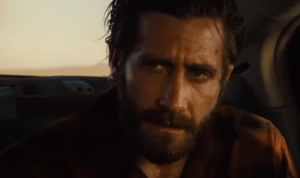Lydia Loveless Teases a New Album with the Gutsy Video

You might hear a lot of similar sentiments about the release of Daughter, Lydia Loveless’ first full-length album in four years: that it’s a triumphant return, that she’s finally back, that it’s long overdue. But make no mistake, what is extraordinary about this release is not that it has taken Loveless more than the allowed time for an artist to create something new before being deemed irrelevant or forgotten, but that she is doing it on her own terms.
“I was tired of being taken advantage of and being treated as an unimportant person, so I think what’s triumphant about this record is that I feel so good having independently released it,” she says. “Because I know that I’m doing exactly what I want to do.”
That tired pattern of releasing a new album every two years and taking on a grueling tour schedule in between can feel endless and unsustainable for artists, particularly in the era of streaming, one-off singles, and constantly needing to be engaged with social media. It is a recipe for burnout, depression, or worse, and to say Loveless was feeling the effects of that pressure after the release of her 2016 LP, Real, is an understatement. Her first full-fledged foray into a more pop-centric sound, Real was the album she had been longing to make after establishing herself as an alt-country cult icon by the time she was in her early 20s. But despite its swooning guitar melodies and the gut-wrenching emotion she packs into every lyric, and despite an impressive promotional cycle, it didn’t land how she expected.
“It’s a stressful and horrible situation to make something that you like and have someone be so ‘meh’ about it. … I don’t think I realized that it was affecting me that it didn’t do as well as I thought it would,” she remembers. “I felt like I was making music that I really wanted to make, and some people were like, ‘You’re not keeping it real anymore, it’s so poppy.’ [But] how can I sell out when my record isn’t selling?”
These kinds of comments, from fans and industry people, took a toll on Loveless. “I feel like people are so into the idea that I must be twangy and if I’m not doing that I’m selling out. So many people will say, ‘You should just take that in stride, take it as a compliment,’ but when you hear that shit every fucking day, it gets so exhausting.”
So rather than calling the last four years a hiatus from music, let’s instead call it a journey for Loveless, one that ultimately led her to Daughter. Her new album, out Sept. 25, is the culmination of her divorce, family struggles, a move to a new city, going public about her painful experience behind the scenes at her former label, Bloodshot Records, and yes, needing a break. But mostly it is, once again, the music she really wants to make.
It is also her most personal record yet, like reading pages ripped straight from her diary. It is laced with regret, self-loathing, shame, heartbreak, and tough realizations about the world we live in. But it is also deeply hopeful and honest.
“I think a lot of people will hear this record and be like, ‘It’s a divorce record,’ but it’s really more like a … self-divorce record,” she says. “It’s more like I was sad that I was alone for the first time in my life at 26 and, wow, I felt like it should have happened a long time ago.”
As she left her hometown of Columbus, Ohio, and settled into her new life in North Carolina, for the first time Loveless began the process of writing songs without her longtime bandmates there to weigh in. Working through bouts of writer’s block and forcing herself to learn how to use new recording equipment, she came out the other end with an album’s worth of songs and a lot of uncertainty.
“It was kind of scary because I didn’t really feel confident about anything I was doing and everything kind of felt all over the place,” she recalls. “But once I started actually recording, it felt like, ‘Oh, I’m making a record. I’m not just writing a bunch of songs that don’t fit together.’”
When it was time to record Daughter, Loveless reunited with her band — multi-instrumentalists Todd May and Jay Gasper and drummer George Hondroulis — at The Loft in Chicago, working with producer Tom Schick to achieve the sound she was looking for: “a sort of dark but dance-y vibe,” as she describes it. To get inspired, she’d been immersing herself in a lot of George Michael and Phil Collins, and “so much Kate Bush,” and we hear that on songs like the earworm standout “Wringer” and the heart-stopping, atmospheric album closer “Don’t Bother Mountain.” Still, even in new sonic territory she remains true to herself. Daughter is a pop album, but it is undeniably a Lydia Loveless album. That signature self-deprecation and raw self-awareness is still there.
“It feels like the most ‘me’ record I’ve ever made,” she says, acknowledging the cliché with a laugh. It starts with “Dead Writer,” a sparser tune that fits sweetly into her alt-country wheelhouse. Inspired by one of her favorite writers, novelist Richard Yates, the song satirizes the concept of 1960s and ’70s male freedom: the tiny apartment in the city away from the wife and kids, plenty of brown liquor and infidelity, and, most notably, the exclusion of women from that narrative. This is a theme on Daughter, its title track a moody, scathing take on what Loveless refers to as the “she’s somebody’s daughter” brand of performative feminist allyship.
“Who gives a fuck? Just treat people like they matter and don’t throw women in dumpsters and use them as entertainment,” she says. “Sexism is so ingrained in culture you can’t escape it.”
Loveless, like so many women, is no stranger to being harassed and disrespected, especially as an artist who entered the music business as a teenager. This song, and the album, call attention to the ways men assign value to women based on their own relationship to them. “There’s never been a better time to be a wife,” she sings over a steady, brooding drumbeat. “If I gave you a daughter, would it be enough?”
“I do think this is the first record where I’ve actually captured a moment in time, which is interesting for me because I didn’t realize I was doing that,” she says. We hear this examination of the way society devalues women and conditions us to accept it on the driving “Love is Not Enough.” She sings about the need for boundaries and the shallow declarations that love will save us all. The heavy slow-build of “Can’t Think” is Loveless’ reckoning with a past version of herself that didn’t know better, all clouded judgment and insecurity. And the gorgeous, synthy “Never” employs lyrical and melodic rounds to create a sense of anxiety and chaos akin to what goes on in Loveless’ own brain.








